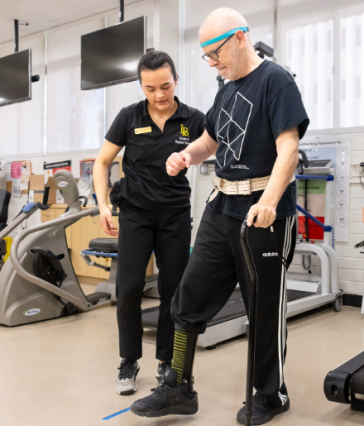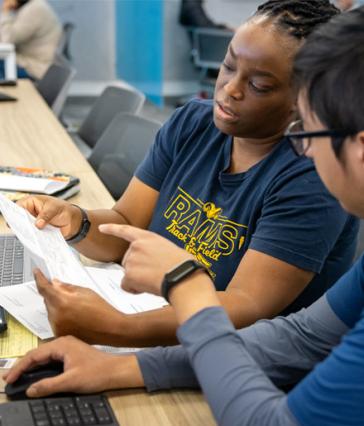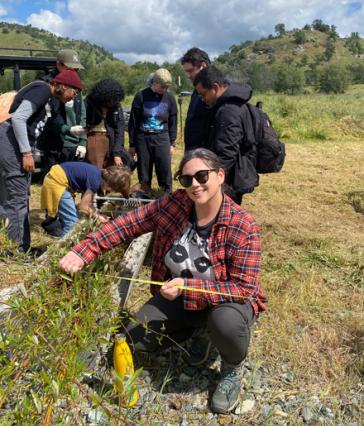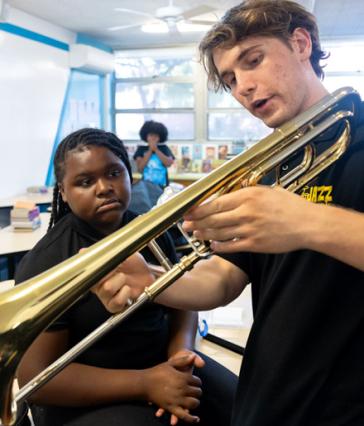Supply chain management students explore opportunities in the classroom, field
A Southern California distribution center, a waypoint for goods moving along intercontinental routes, recently fulfilled an additional role while hosting Cal State Long Beach students observing the supply chain in action.
The students donned orange and yellow safety vests before venturing into the facility’s cavernous operational area, where guides explained how people working within ensure products originating overseas end up at the correct destinations. For students aspiring to a career in logistics, activities like this early October field trip are a way to glimpse what day-to-day work entails.
“Being in the presence of something that you’re learning about in the classroom, seeing it real life and hearing all this jargon in real life ... this stuff is important,” said fourth-year student Elena Watson, studying business management and supply chain management. “We have to pay attention in class so you can use it in the real world,” Watson also said.
Watson is president of the campus’ chapter of the Society for the Advancement of Management (SAM), the student group that arranged the tour. She and others studying supply chain management at The Beach are doing so while the College of Business is in its third year of expanding undergraduate instruction in the field.
Industry representatives on the college’s Operations and Supply Chain Management Advisory Board have informed the updates, which include faculty hires and added courses. Associate professor of supply chain management Jessica Robinson, who has taken a lead role in revamping the undergraduate program, also participated in the early October tour.
"I'd like to applaud all the efforts Dr. Robinson has expended on refreshing the curriculum for operations and supply chain at the College of Business,” advisory board chair Frank Thompson said. “Initially soliciting feedback from the advisory board to help identify opportunities to supplement the curriculum, she then personally developed and deployed the new courses.”
“These updates will not only better prepare the students for the ever-evolving skills needed within the professional community but will help distinguish the students during the recruiting and hiring process,” he continued. “Additionally, these changes will help distinguish the OSCM program at CSULB from its peers.”
Thompson also supports the Frank and Elsa Thompson Endowed Scholarship, for upper-level undergraduates who are employed while taking the supply chain management option on the way to a Bachelor of Science in Business Administration.
Critical links
A Maersk distribution center in Mira Loma, Riverside County hosted the touring students. The site encompasses 650,000 square feet, nearly five-and-a-half times Walter Pyramid’s footprint, and specializes in moving imported shoes and other goods to e-commerce, retail and warehousing customers.
“The thing I enjoyed the most was the cohesiveness of everybody,” said fourth-year student and SAM events committee member Baron Hayes, studying international business and supply chain management. “Everyone was doing their own job, but you could tell how one person needed to complete a job so the next person could complete theirs.”
The tour began on the center’s receiving side, where forklift drivers honked warnings while passing tall aisles of pallet racks stocked with clusters of brown boxes. Students followed guides toward the building’s center where the sounds of mechanized commerce – whirring industrial fans and thrumming conveyor machinery – filled the air. An elevated platform afforded a bird’s eye view of an elaborate conveyor network resembling a miniature freeway system.
Students learned how people working at the center stock, pick, repack and label goods, some of which are stored in specialized areas, so they can be directed to the shipping side and loaded onto the correct delivery trucks.
“That’s why I really like going to these tours, because it connects what I learn in the classroom and what I actually see out here in real life,” fourth-year supply chain management student and SAM executive vice president Francisco Solis-Olivares said. “It was really cool how it was sectioned depending on the customer and each customer had different requirements”
Solis-Olivares came to The Beach after serving as a supply chain and materials management specialist in the U.S. Marine Corps. His gunnery sergeant recommended he continue with supply chain operations for his post-service career.
José Chávez, a fourth-year business supply chain management student and SAM vice president of corporate relations, transferred from Santa Monica College. He took an interest in supply chains while working at a grocery store, where his duties included signing for incoming orders.
“Knowing the steps that it takes for it to get to my house from the very beginning, from sourcing the raw materials from another country and then actually getting it shipped over here to the port, and then from the port to the fulfillment center, and then from there to my house, that’s something I enjoyed learning little by little,” Chávez said.
Delivering opportunities
In Los Angeles County, nearly 277,000 people worked in the trade sector in 2022, according to an April report from the Los Angeles County Economic Development Corp. That amounted to about 7% of the county’s workforce, although the sector had not fully recovered from COVID-19's disruptions.
Nevertheless, the California Employment Development Department projects that logisticians, people overseeing how companies obtain and disperse goods, will be among the most in-demand professionals around Long Beach.
Among jobs requiring a bachelor’s degree, logisticians are projected to be the fastest growing job in both Los Angeles and Orange counties. In Los Angeles County, their number is expected to increase by about 38% to nearly 8,800 people over 2020-30. In Orange County, a projected 43% increase would result in more than 3,400 working logisticians.
“At Maersk, we believe in the power of diversity, collaboration, and continuous learning. As we engage with students, we emphasize the importance of nurturing the next generation of supply chain professionals. With a growing demand for skilled talent, we are committed to providing career opportunities that not only empower individuals but also contribute to the future of global trade and logistics.” said Fred Gilbert, regional head of contract logistics strategy for Maersk and a member of the operations and supply chain management board.
Since fall 2022, the College of Business has grown its capacity to help undergraduates to become goods movement professionals. The college has increased the number of undergraduate supply chain management courses from three to seven. Two new faculty members, for a total of five, are now part of the expanded program.
Additionally, undergraduates can take courses preparing them for professional project management and Six Sigma certifications.
“I remember being an undergraduate student, thinking what can I do to differentiate myself from other candidates on the competitive job market?” Robinson said. “Joining student organizations and holding leadership positions, getting an internship, and volunteering are all great ways, but very time consuming, especially while managing other responsibilities and coursework.”
“As a professor, I wanted to help our students to compete when they enter the job market,” she continued. “Therefore, while revisiting the curriculum, I came up with the idea of making our courses do more than just fulfill the degree requirements. There has been a growing interest and offerings of professional certifications.”

















